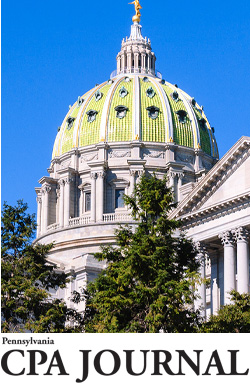Budget, Elections, and Tax Issues to Dominate Harrisburg in 2022
While the Pennsylvania General Assembly may run until Nov. 30, the state legislature will have to address the budget, statewide elections, and tax proposals well before then.
by Peter N. Calcara, CAE Mar 18, 2022, 11:19 AM

The 2021-2022 session of the Pennsylvania General Assembly may run until Nov. 30, 2022, but it is in the coming weeks and months that state legislators will have their hands full with numerous issues of interest to PICPA members and their clients. This
article highlights three of the top issues the PICPA believes will take center stage in 2022: passage of a new fiscal year budget, statewide elections, and tax proposals.
Budget
Gov. Tom Wolf presented his eighth and final budget to a joint session of the General Assembly on Feb. 8, 2022. Wolf’s plan calls for spending $43.7 billion in fiscal year 2022-2023, an increase of $6.2 billion. Among Wolf’s proposals are
a major increase in basic education funding, investments in workforce and economic development initiatives, more mental health support and services for individuals with disabilities, and an increase in the state’s minimum wage. The plan also
calls for cutting the state’s 9.99% corporate net income tax rate. The governor’s budget anticipates using $5.1 billion of Coronavirus State Fiscal Recovery Funding from the 2021 American Rescue Plan.
His proposals present
a challenge to lawmakers. While the fiscal year 2021-2022 state budget was approved by the General Assembly before the June 30 deadline, a lot of stakeholders were disappointed that quite a few issues were left on the table. In addition, lawmakers
only spent about $1 billion of the $7.3 billion the state received in federal American Rescue Plan funds, opting to hold back on spending the bulk of these monies, which can be spent over the next three years.
Furthermore, through the first
six months of the current fiscal year, state revenues surged. As of December 2021, Pennsylvania had collected $22.6 billion, which is $1.5 billion (or 7.0%) above estimate. State revenue collections are expected to reach an estimated $2 billion over
expectations when the fiscal year ends June 30, 2022.
Having literally billions of dollars piling up in state coffers can be both a blessing and a curse to lawmakers. Spend too much, and the commonwealth could be back in the structural
deficit quagmire it had been in for a decade or more. Leave too much in reserve, and legislators will face the wrath of special interest groups anxious to secure funds for their causes.
Elections
Pennsylvania’s 2022 election season is expected to be one of the most competitive and costly in years. Statewide elections in 2022 include a gubernatorial race, a vacant U.S. Senate seat, and 17 congressional districts. In addition, 203 state House
and 25 state Senate seats are being contested, with control over one or both chambers in play.
Adding another layer of ferocity to the elections is the fact that congressional and state legislative races will be in newly drawn districts.
Reapportionment is a contentious process, and this year has been no exception. Every 10 years, following the release of U.S. Census data, the state is required to redraw its congressional and state legislative districts. As a result of stagnant population
growth, Pennsylvania is losing one congressional seat – dropping from the current 18 to 17.
State Tax
With Pennsylvania awash in cash (as mentioned above), state tax reform may be ripe for consideration. Two legislative issues the PICPA and our State Taxation Steering Committee are watching include bonus depreciation and a pass-through-entity tax.
Pennsylvania’s current corporate net income tax depreciation provisions negatively impact its economic competitiveness. Act 72 of 2018 eliminated some of the adverse tax treatment for corporations that take advantage of the 100% bonus
depreciation for federal tax purposes, but Pennsylvania still does not allow bonus depreciation for corporate net income tax purposes.
The PICPA’s position is that the current corporate net income tax depreciation provisions need
to reflect the stated objectives of Act 72 and to promote simplicity in its application. The current complexity makes compliance with, and administration of, these provisions difficult and costly, frequently resulting in desk review or audit adjustments
or assessments. State Rep. Rob Mercuri (R-Allegheny) introduced legislation addressing PICPA’s concerns.
The federal Tax Cuts and Jobs Act of 2017 (TCJA) imposed a $10,000 state and local tax deduction limitation (SALT cap)
applicable for tax years 2018 through 2025. The SALT cap prevents many individuals from being able to fully deduct state and local income and property taxes on their federal individual income tax returns. To mitigate the impact of the federal SALT
cap, states have adopted statutes that facilitate the deduction of additional state income taxes on federal returns. The common thread among these efforts is the imposition of entity-level taxes on pass-through entities (PTE tax).
The
PTE tax is an entity-level income tax with a related credit owners can claim on their respective state individual income tax returns. In our region, Connecticut, Maryland, New Jersey, and New York each have enacted PTE taxes. Across the country, nearly
20 states have enacted PTE taxes, with several others considering enactment.
House Bill 1709, sponsored by Rep. Martina White (R-Philadelphia), would enact a PTE tax that allows a credit for resident partners and S corporation shareholders.
The PICPA is spearheading efforts to pass such legislation.
Peter N. Calcara, CAE, vice president – government relations, for the PICPA. He can be reached at pcalcara@picpa.org.


Leave a commentOrder by
Newest on top Oldest on top